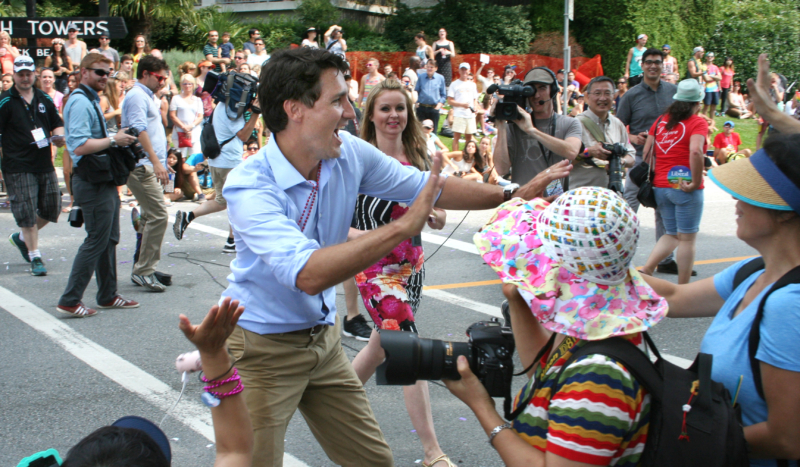
By vl04 - Flickr, Justin Trudeau at the 2015 Vancouver "Pride" Parade
CV NEWS FEED // A Canadian Federal Court Justice ruled that Prime Minister Justin Trudeau unjustifiably and unconstitutionally used force against truckers who took part in the Freedom Convoy protest.
“I conclude that there was no national emergency justifying the invocation of the Emergencies Act and the decision to do so was therefore unreasonable and ultra vires,” wrote Justice Richard Mosley Tuesday.
“Ultra vires” is a legal phrase used to denote that a government or other party acted outside its given powers.
“I have concluded that the decision to issue the proclamation does not bear the hallmarks of reasonableness – justification, transparency and intelligibility,” Mosley added.
He stated that the government’s use of emergency powers “was not justified in relation to the relevant factual and legal constraints that were required to be taken into consideration.”
Moseley also found that Trudeau’s action “infringed” on the Canadian Charter of Rights and Freedoms – a bill of rights that became part of the country’s Constitution in 1982.
In winter 2022, hundreds of Canadian truck drivers formed a convoy headed to the capital city of Ottawa in protest against the country’s stringent COVID shot and mask mandates. They were soon joined by tens of thousands of citizens, both in their cars and on foot.
The Trudeau government, which fervently supported the mandates, responded by invoking the Emergencies Act, a 1988 statute that – per the BBC – “bestows the government with added powers in times of crisis.”
Despite the act being on the books for nearly 34 years at the time, the Canadian government’s response to the convoy protest marked the first and only time it was invoked.
The BBC reported: “The emergency powers allowed the government to impose bans on public assembly in some areas and to prohibit travel to protest zones, including by foreign nationals, among other measures.”
The Wall Street Journal added that “[a]mong the measures temporarily invoked was the freezing of bank accounts and other assets belonging to convoy protesters.”
The Justice Centre for Constitutional Freedoms (JCCF) is a legal group that represented some of the protesters. “The constitutional challenge to the invocation of the Emergencies Act was filed on behalf of four Canadians who had participated in the peaceful Freedom Convoy protest in Ottawa in January and February 2022,” the JCCF noted:
Each of the plaintiffs suffered significant harm during the militaristic police crackdown that began on February 18, 2022. Two of the applicants represented by the Justice Centre had their bank accounts frozen and seized, without judicial authorization or a review process, under laws that normally apply only to terrorists and enemy nations.
Sixty-four-year-old Edward Cornell is one of the protesters Trudeau targeted. “I broke no law, yet the government seized my accounts and froze my hard-earned money,” Cornell said. “I am not a criminal. I am not a terrorist. I am a retired Canadian military veteran who honourably served his country.”
“I feel betrayed by my own government,” he added.
Months before the protest, Trudeau said that Canadians who chose not to get a COVID shot “don’t believe in science/progress and are very often misogynistic and racist.”
“This leads us, as a leader and as a country, to make a choice,” the prime minister continued. “Do we tolerate these people?”
Trudeau’s government indicated that they will appeal this week’s ruling.
“[W]e do not agree with this decision, and respectfully, we will be appealing it,” said Canadian Deputy Prime Minister Chrystia Freeland.
Freeland added that she and the rest of the Trudeau ministry stand by the decision to invoke the Emergencies Act: “I was convinced at the time it was the right thing to do, it was the necessary thing to do. I remain and we remain convinced of that.”

